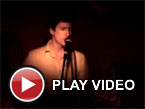
 
Justin Patrick: The phrases "Duty Experiment," "Guerilla Ontology," "Boycott Consensus Reality," and "Neo-Tantric" turn up frequently in association with your artistic work. What do these tag lines mean to you and how do they relate to what you do as an artist?
Nigel: For quite a few years, although I had a degree in visual art, I tried to avoid calling myself an artist. That's because I found the term to be very politically loaded, as the development of the idea of the artist had implications that were central to a class-based society. For a few years I preferred to call myself something like a "cultural worker." I felt I always benefited from my fine art background as the British art schools were, at the time I went through them in the mid-'70s, very good at sharpening your critical perception, especially self-criticism which can for some be creatively crippling. They made you creative, very tolerant of uncertainty, and very flexible. I think that nowadays they retain many of these qualities, but since the "Brit Art" phenomenon of the '90s, art has become more of a "career option" when you have aspirations of being a Damien Hirst, and a head full of corporate X-Factor bullshit.
Anyway, I think actually it was before the rise of Hirst, I thought it might be an idea to reclaim the craft of "the artist." And anyway I don't think what I do is anything else. And there are positive sides to the idea of being an artist, it's a small piece of freedom in a repressive culture. So as an artist, I feel that I am working with the field of information. About how we see and experience our exterior and interior "realities." I have a tendency to seeing art more as a hammer-like more than a mirror-like tool, that is in using art, you are changing reality ..and society.. just a little bit.
Using memorable bite-sized phrases, slogans and tag lines in my work is a form of poetry I've explored. As an artist you create the frame around your work and this includes the labels that might be stuck on the wall around it. Critical writing, interviews, and other published texts are opportunities for word play, in creating personas, they are part of the work and help create its social meaning. I use a variant form of "Guerrilla Ontology" which is "Guerrilla Sign Ontology." Cryptic crossword lovers will notice this phrase contains the words "Sign- On," which is what you have to do to get Unemployment Benefit in the UK. Developing my art in Thatcher's Britain, Unemployment Benefit was very very useful. "Duty Experiment" is a phrase borrowed from a bundle of photocopied documents I salvaged from the skip/dumpster when I worked as a cleaner in the India High Commission. (I could say it was something I found when I worked in India, as India House, being the embassy, is legally part of India although it's in London).
This was a piece of "outsider art" sent in by an apparently psychotic member of the public. I recycled parts of the text in early NE work "Tissue of Lies," as well as in The Pump project. "Boycott Consensus Reality" is an appropriate, precise, and polite response to the colonization of our everyday dream worlds by totalitarian corporations and their pernicious advertising. "Neo-tantric," that's one I've sort of dropped a bit, because it got taken up by a well-known religious cult. What I was looking at was integrating rational humanism within animism, the idea is an ecological thing developed from surrealism, and nothing whatever to do with how Sting has sex.
JP: You are perhaps best known for your musical activities under the moniker of Nocturnal Emissions, yet you continue to remain active in other media. Your "War Criminal" images of Tony Blair and George W. Bush have spread around the globe. You have released a book of spam poetry, The Control You Gain, The Power You Use, and a book documenting your psychogeographic explorations of the Bodmin Moor in your home of Cornwall, along with a few other books. You work with video, put together installations, and have been making electronic gadgets. How do all of these different modes of operation relate to each other?
Nigel: I think they all address the idea of being a multi-dimensional person, and that multi-dimensional personality being shaped by social forces, as well as helping to shape those forces back, as a tool-maker. I like to get away from the bourgeois idea of being an author, and become more of a medium for exploring, focusing and sharing existing memes. Maybe I can put a new twist on them or distort and degrade and mutate information, and subject it to critical inspection but the pleasure is in bouncing that material back and forth into the world. It's a kind of information-dance.
JP: Is there an area of focus you'd like to spend more time exploring?
Nigel: I prefer to be a non-specialist.
JP: You've made a number of books available through Print-On-Demand services. One is a roundup of the Network News, featuring many authors, which you distributed between 1990 and 1999. Another that you edited is A Dictionary of Space Cornish. This came out in conjunction with the Cornwall Community Space Program to document the language for space that they developed. How did you become involved in this project that took the Cornish language and adjusted it to make it more suitable for space travel?
Nigel: A Dictionary of Space Cornish came about through my involvement with the Association of Autonomous Astronauts, which was an international network of activists committed to resisting gravity, and evolved from group discussions.
JP: Much of your work has been inspired by the landscapes of your home in Cornwall. You've created a body of work that I see as being a reciprocal feedback loop with the environment. Now you are colonizing Google maps by embedding your videos and music into the application. Science fiction author Rudy Rucker has been using the street view on Google maps as a way to go to a place without actually visiting it, so he can then write about that location. Do you have any other creative uses for Google maps or similar programs planned? What can you envisage other artists using these interactive map spaces for in the future?
Nigel: That thing about feedback loops is interesting on my mind. I think our memories are shaped by media systems, it's the way we share our inner landscape. I think it's important to tap into these global systems, which somehow form our collective memory. It seems, from what I've read about mnemonics, that location-based systems are particularly memorable.
Also, apparently a larger percentage of people believe in astrology than any of the major world religions. I'm not sure that my art practice colonizes these mnemonic spaces, rather that it takes up a kind of viral residence in shared public space. My art practice has something to do with recapturing the imagination. I think the imagination is colonized by meanings attached to flags and logos. Mass murder isn't mass murder if it's wrapped in a flag–if we don't take charge of symbols, then symbols and the emotions attached to them will take charge of us. By the way, if anyone is colonizing public space, it's not me, it's Google. Google extends private property into public space, each screen shot has this corporate image encoded within in. I'm trying to do something very personal and basic, reclaim my own personal space. But also I'm encoding in the videos a scrambling of memory–modern urban planners are latter-day druids, reshaping the landscape in the shape of their own gods and goddesses. I think these kind of viral art campaigns are a way of reclaiming space for the imagination, and to restore a bit of sanity and sense of community. I think there is a basic anger in my work, an anger at the huma



